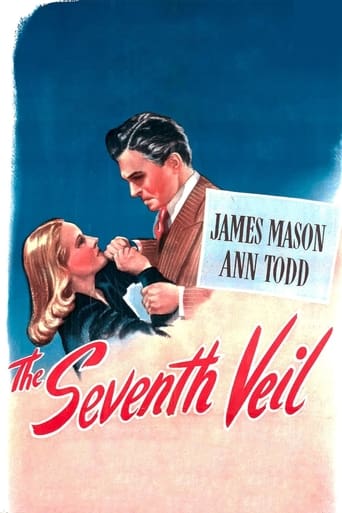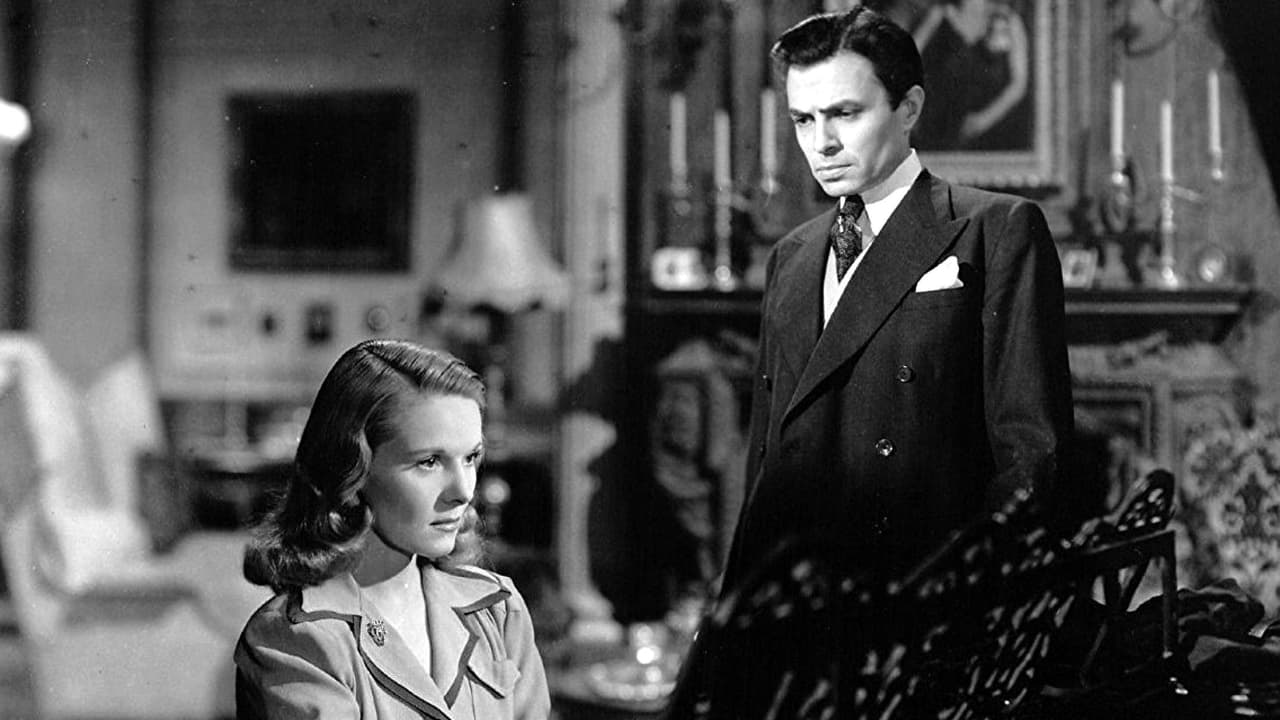bkoganbing
In the same year that Alfred Hitchcock came out with Spellbound our allies across the pond released The Seventh Veil yet another study on psychiatry. Both films are great entertainment, but do treat psychiatry as a science rather superficially. Then again the purpose of film is to entertain before anything else.Ann Todd who may have been the most beautiful woman ever to be on screen in any country tries to throw herself in the Thames when she's rescued and hospitalized. Psychiatrist Herbert Lom takes her case and gets her to open up with a combination of hypnosis and drugs.Seems that Todd is a famous concert pianist who has a lot of issues. Music is her life, her source of identification with the world. Orphaned as a teen, she comes under the guardianship of a distant cousin James Mason who more than encourages her talent.But Mason's got a lot of issues of his own and we get to hear about some of them via some servant gossip. He's a merciless and possessive taskmaster and causes the breakup of two of Todd's potential romances.The Seventh Veil won an Oscar for Original Screenplay and the story does have some original aspects. For myself though, I think James Mason may have needed a few sessions with Lom about some of his issues in order to effect a truly happy ending.
dougdoepke
A confined, upper-class English girl is passed over to a guardian where she is made to practice piano.Leave it to the British to treat the subject of repressed emotion with such class and restraint. Francesca (Todd) is the very epitome of repressed feeling thanks to those presiding tyrannically over her life. Her only release from a cheerless existence are lushly romantic concerts, where the gloriously surging music echoes what's inside her. Without that, we might never know what lies beyond those tightly pursed lips. Even her quietly assertive flings with Peter and Maxwell are stripped of anything like outward emotions.And all the time, her crippled guardian (Mason) makes her practice and practice and practice, alone and in an empty mansion. Poor Francesca, no wonder she cracks up. Nonetheless, it's drawing room drama at its most civilized.I get a kick out of imagining how a boisterous American studio such as Warner Bros. would have handled the material, maybe with Joan Crawford in the lead. Anyway, Todd is appropriately restrained, while Mason is darkly mysterious as the Svengali taskmaster. But, I'm still wondering why that last scene seems so right when the screenplay has given us so little preparation to think it would be. Maybe it's the power of Mason's brooding presence that makes it work, but I think it does.Anyway, as long as you don't mind presiding psychiatrists (Lom) with an answer for everything that ails us, this may be your cup of tea, British style.
Michael Neumann
Chopin meets Freud in this story of a classical pianist and her rise to international stardom under the tutelage of her possessive Svengali uncle, played by a menacing, misogynist James Mason. The plot unfolds largely in flashback from the psychiatrist's couch, where the troubled patient, under hypnosis, recounts the traumas of her young life, including a whirlwind engagement to an American musician and a romance with a sympathetic portrait artist (both attracting the ire of Uncle Mason). The end result of all this therapy is to see which of the four men (including psychiatrist Herbert Lom) she'll turn to when cured, but her ultimate (and not entirely unpredictable) decision is a little suspicious: maybe she should have spent more time on the doctor's sofa.
Jem Odewahn
THE SEVENTH VEIL is a dear film favourite of mine. I find the film semi-addictive, very enjoyable and strangely hypnotic, even haunting. This surprise little hit of 1945 (made on a small budget)did wonders at the box office and picked up an Oscar.I won't summarise the plot here, but I will offer an interesting discussion on the film for those who like to enjoy yet also ponder the meaning behind THE SEVENTH VEIL....It's a film that attracts a lot of divisive opinion. To many, it's enjoyable romantic kitsch- harmless fun. Some (my mother would fall into this category)find it mildly disturbing that our heroine, the lovely, brilliant yet tortured concert pianist Francesa (Ann Todd), runs straight into the arms of the guardian, Nicholas (an excellent James Mason in his best early role) who cut her off from having a normal life and also attempted to smash her fingers with his ever-present (some Freudian fun?) cane. Others call it a fine little film, a classic even. Still others (critic Pauline Kael) refer to it as a "sadomasochist's sundae", and point out that Nicholas and Francesca are clearly going to need years of "couples counselling" to achieve a normal, functioning relationship.One of the main criticisms levelled at it is it's now-dated psychiatry theme. However, the theme pleasingly does not meander in too much psychobabble (unlike the same year's SPELLBOUND), and Herbert Lom, in a role that is now cliché, is very good indeed. I like the flashback structure (again, now a standard cliché of the Hollywood film)and I think it, along with the Freudian overtones, would have seemed fresh in the 1940's.Other criticisms that seem to frequently appear are the casting of Ann Todd and her appearance as fourteen year old girl in school dress. Some ask why the did not simply get a teen actress who resembles Todd to play Francesca as a girl? Budget constraints have often been cited as a reason for this. However, I think it's more to do with the film-makers idea that having Todd voice-over narrate and then play Francesa all through childhood, adolescence and womanhood would build her character and establish narrative flow. I personally don't mind the schoolgirl scenes (even if Todd, at 36, looks far too old and is trying just a little too hard to be an earnest adolescent)-they certainly don't lessen the film for me.As for casting Todd, she of the alabaster Garbo-like face, well, I don't mind that either. I thinks she's fine in the role. Never an emotive or even an expressive actress, Todd does suggest Francesca's austerity, guarded repression and shyness well. Her eyes in the scene where she receives a caning from the headmistress do a lot more for me than words could. She certainly does a good job faking the piano-playing scenes.I think the film is weakest in the "Max" scenes. I feel he is just there as a plot convenience (three suitors instead of two), his part is rather poorly written (and rather blandly acted)and he just seems to be a filler to get Mason really cranky and send Todd into a breakdown. Peter would probably be the most "normal" choice for Francesca...yet does he really want her anymore? The ending is probably the major quibble folks have with the film. Why, after copping seemingly nothing more than abuse, should our heroine run to Mason? I think the implication is that she has, unconsciously, loved him along yet needed to have Lom take off those "veils" for her to realise it. Or maybe she knows she really does love him all along ("he has a strange power over me"..."I don't think I can help myself") but is afraid of the harsh front he wears to mask his own true feelings. Yes, Mason does love her- and, as we see in that very revealing scene (and Todd doesn't see it...)where Nicholas slowly softens and smiles as Francesca is giving a concert, he treasures her. The way he gets the flowers ready and quickly plucks one off (presumably to present to her), makes him seem like an uncertain, yet besotted suitor. Then she walks straight past him in search of Peter- does anyone else feel really sorry for poor Nicholas at this point in the film? I know I sure do! He wants to be with her all the time...obsessive, yes, yet oddly natural given his great love for her...Mason, of course, is the key to the film. His Nicholas, sitting dourly in his chair and stroking a cat, seems at first, to be another cranky, sardonic (yet delicious!) villain in the vein of Lord Rohan (The Man In Grey) or Lord Manderstoke (Fanny By Gaslight), two of his most famous Gainsborough roles. Yet his character arc becomes something quite different entirely. There is something very saddening about Nicholas- and I'm not making excuses for the cane-beating or emotional abuse-that draws the viewer to Mason's character (and, indeed, it's a wonderful performance from Mason, and does he look darkly handsome!). Before Francesca comes into his life (and, as we, the audience know all along and receive official confirmation at the end)he has lived a lonely life as both a physical and emotional cripple. Very rich, but very sad. Sounds strange, but I hate the thought of Nicholas limping around his mansion, without Francesca and only her portrait to comfort-or further emotionally cripple him?-him, hiding his thoughts to himself. Ah, maybe it's the unabashed romantic in me, but Nicholas needs Francesa with him- as he says, in that desperate attempt to make her stay that ends with her hands being beaten, he "can't live without her". It's certainly an interesting relationship!


 AD
AD



